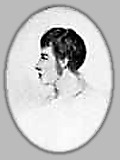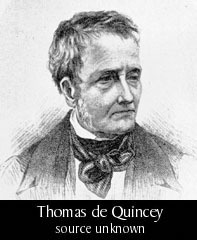
©Extrait de Portrait d’un mangeur d’opium par Bertrand Leclair,

| Thomas
De Quincey
|

©Extrait de Portrait d’un mangeur d’opium par Bertrand Leclair, |
 |
English essayist and critic, best-known for his autobiography CONFESSIONS OF AN ENGLISH OPIUM EATER which appeared first in 1821 in London Magazine. De Quincey was addicted to opium from his youth for the rest of his life, and his influence on Poe and Baudelaire and ordinary readers tempted to experiment with opium, has been immense and malign.
De Quincey was
born in the burgeoning industrial city of Manchester, Lancashire, as the
son of a linen merchant. He waseducated at schools in Bath and Winkfield,
ending at Manchester Grammar School from which he ran away to Wales at
the age of 17 - with the knowledge and support of mother and uncle. Between
the years 1802 and 1803 he lived in London in poverty before returning
back home. To opium De Quincey became addicted in 1804 when he studied
at Worcester College,Oxford. He used it first to relieve acute neuralgia
pains and kept a decanter of laudanum by his elbow and steadily encreased
to
dose.
After De Quincey left Oxford without taking a degree he became in 1807 close friends with the romantic writers Taylor Coleridge, whom he met on a visit to the fashionable town of Bath. Coleridge introduced him to Robert Southey and William Wordsworth. In 1809 he went ot live with them in the Lake District village of Grasmere. Suffering a series of debilitating illnesses between 1812 and 1813 De Quincey started to take opium, becoming in 1813 a daily user, although he was able to controll his habit until about 1817. He married Margaret Simpson, a farmer's daughter, by whom he had eight children. Having exhausted his private fortune, he started to earn living by journalism, and was appointed as editor of a local Tory newspaper,the Westmoreland Gazette. For the next 30 years he supported his family, mainly in Edinburgh, by tales, articles, and reviews.
Early in the 1820 De Quincey moved to London, where he contributed the London Magazine and Blackwoods. His chronicle Confessions of an English Opium Eater, depicting both the ecstasies and the torments of the drug, was an instant success.His book inclued quotes in Greek, Latin and Italian, and without considering its intellectually and physically corruptive effects,De Quincey took the drug in hope of increasing his rationality and the sense of harmony. For him opium was not a part ofcriminal, alienated lifestyle.
In 1826 De Quincey
moved to Edinburgh and after the death of his wife he was again using heavily
opium. Between the years 1841 and 1843 he hide the creditors in Glasgow.
From 1853 until his death De Quincey worked with his SELECTIONS GRAVE AND
GAY, FROM THE WRITINGS, PUBLISHED AND UNPUBLISHED, BY THOMAS DE QUINCEY.Though
he wrote voluminously he published only few books and had constant financial
difficulties. Most of his works were written for periodicals. As a writer
De Quincey's strong poits were his sensitive, inward-turning imagination
and his breadth of
understanding. He wrote also studies
about such German philosophers as Kant, Lessing, Richer.
De Quincey's
influence in depicting nightmarish movements of mind is later seen in the
works of Edgar Allan Poe
and Charles Baudelaire.
It has been also suggested, that he prefigurated modern Outsider-writers
such as Alexander Trocchi, for whom drugs served as confirmation of their
alienation from mainstream society.
Copyright Kuusankosken kaupunginkirjasto,Filand
© 1997
http://www.kirjasto.sci.fi/quincey.htm